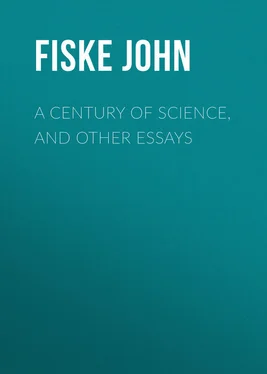John Fiske - A Century of Science, and Other Essays
Здесь есть возможность читать онлайн «John Fiske - A Century of Science, and Other Essays» — ознакомительный отрывок электронной книги совершенно бесплатно, а после прочтения отрывка купить полную версию. В некоторых случаях можно слушать аудио, скачать через торрент в формате fb2 и присутствует краткое содержание. Жанр: foreign_antique, foreign_prose, на английском языке. Описание произведения, (предисловие) а так же отзывы посетителей доступны на портале библиотеки ЛибКат.
- Название:A Century of Science, and Other Essays
- Автор:
- Жанр:
- Год:неизвестен
- ISBN:нет данных
- Рейтинг книги:3 / 5. Голосов: 1
-
Избранное:Добавить в избранное
- Отзывы:
-
Ваша оценка:
- 60
- 1
- 2
- 3
- 4
- 5
A Century of Science, and Other Essays: краткое содержание, описание и аннотация
Предлагаем к чтению аннотацию, описание, краткое содержание или предисловие (зависит от того, что написал сам автор книги «A Century of Science, and Other Essays»). Если вы не нашли необходимую информацию о книге — напишите в комментариях, мы постараемся отыскать её.
A Century of Science, and Other Essays — читать онлайн ознакомительный отрывок
Ниже представлен текст книги, разбитый по страницам. Система сохранения места последней прочитанной страницы, позволяет с удобством читать онлайн бесплатно книгу «A Century of Science, and Other Essays», без необходимости каждый раз заново искать на чём Вы остановились. Поставьте закладку, и сможете в любой момент перейти на страницу, на которой закончили чтение.
Интервал:
Закладка:
John Fiske
A Century of Science, and Other Essays
DEDICATORY EPISTLE TO THOMAS SERGEANT PERRY, PROFESSOR OF ENGLISH LITERATURE IN THE KEIO GIJUKU, AT TOKYO
Dear Tom, – It has long been my wish to make you the patron saint or tutelar divinity of some book of mine, and it has lately occurred to me that it ought to be a book of the desultory and chatty sort that would remind you, in your present exile at the world's eastern rim, of the many quiet evenings of old, when, over a tankard of mellow October and pipe of fragrant Virginia, while Yule logs crackled blithely and the music of pattering sleet was upon the window-pane, we used to roam in fancy through the universe and give free utterance to such thoughts, sedate or frivolous, as seemed to us good. I dare say the present volume may serve as an epitome of many such old-time sessions of sweet discourse, which I trust we shall by and by repeat and renew.
But there is one link of association which in my mind especially connects you with the present occasion. My theory of the causes and effects of the prolongation of human infancy, with reference to the evolution of man, was first published in the "North American Review" for October, 1873, when you were the editor of that periodical. The article, which was entitled "The Progress from Brute to Man," was made up of two chapters of my "Outlines of Cosmic Philosophy" (part ii. chaps, xxi., xxii.), which was published a year later, in October, 1874. The value of the theory therein set forth was at once recognized by many leading naturalists. In the address of Vice-President Edward Morse, before the American Association, at its meeting at Buffalo in 1876, my theory receives extended notice as one of the most important contributions yet made to the Doctrine of Evolution; and it is declared that I have given "for the first time a rational explanation of the origin and persistence of family relations, and thence communal [ i. e. , clan] relations, and, finally, of society." 1 1 Morse, What American Zoölogists have done for Evolution , pp. 37, 39-41, Salem, 1876; Proc. Amer. Assoc. for Adv. of Sci. , vol. xxii.
Uncontrollable circumstances have prevented my giving to the further elaboration of this infancy theory the time and attention which it deserves and demands; but in my little book, "The Destiny of Man," published in 1884, I gave a popular exposition of it which has made it widely known in all English-speaking countries and on the continent of Europe, as well as among your worthy Japanese neighbours, Tom, who have done me the honour to translate some of my books into their vernacular. The theory has become still further popularized through having furnished the starting-point for some of the most characteristic speculations of the late Henry Drummond. In these and other ways my infancy theory has so far entered into the current thoughts of the present age that people have (naturally enough) begun to forget with whom it originated. For example, in the recent book, "Through Nature to God," while criticising a remark of Huxley's, I found it desirable to make a restatement of the infancy theory; whereupon a friendly reviewer, referring to that particular part of the book, observes that "of course" it makes no pretensions to originality, but is simply my lucid summary of speculations with which every reader of Darwin, Spencer, Huxley, Romanes, and Drummond is familiar! In point of fact, not the faintest suggestion of this infancy theory can be found in all the writings of Darwin, Huxley, and Romanes. In Spencer's "Sociology," vol. i. p. 630, it is briefly mentioned with approval as an important contribution originating with me; and in Drummond's "Ascent of Man," which is really built upon it, credit is cordially given me. 2 2 The Ascent of Man , pp. 282-291; cf. Tyler, The Whence and the Whither of Man , pp. 179, 217, etc.
Indeed, down to the present time, I have been left almost in exclusive possession of that area of speculation which is occupied with the genesis of Man as connected with that prolongation of infancy which first began to become conspicuous in the manlike apes. There are many who assent to what I have put forth, but few who seem inclined to enter that difficult field on the marchland between biology, psychology, and sociology. Doubtless this is because the attention of the scientific world has for forty years been absorbed in the more general questions concerning the competency of natural selection, the causes of variation, the agencies alleged by Lamarck, and in these latter days Weismannism, etc. In course of time, however, the more special problems connected with man's genesis will surely come uppermost, and then we may hope to see the causes of the lengthening of infancy investigated by thinkers duly conversant alike with psychology and embryology.
Questions of priority in originating new theories may not greatly interest the general reader, but you and I feel interested in preventing any misconception in the present case; and it was thus that the careless remark of the friendly reviewer led me to insert in the present volume the shorthand report of some autobiographical remarks on the infancy theory. In reading the proof-sheets I have noticed that the book contains elsewhere many allusions to personal experiences. This feature, which was quite unforeseen, will not fail to commend it all the more strongly to you, my ancient friend and comrade. As for readers in general, I may best conclude in the words of old Aaron Rathbone, whose book entitled "The Surveyor" was dated "from my lodging at the house of M. Roger Bvrgis, against Salisburie-house-gate, in the Strand, this sixt of Nouember, 1616." This wise and placid philosopher saith: "To perswade the courteous were causelesse, for they are naturally kind; and to diswade the captious were bootless, for they will not be diverted. Let the first make true vse of these my labours, and they shall find pleasure and profit therein; let the last (if they like not) leave it, and it shall not offend them."
Wherefore let me, without further ado, subscribe myself,
Ever yours, JOHN FISKE. Cambridge, October 25, 1899 .I
A CENTURY OF SCIENCE 3 3 An address delivered in the First Unitarian Church of Philadelphia, May 13, 1896, at the celebration of the one hundredth anniversary of its founding, under the lead of the illustrious Dr. Priestley.
In the course of the year 1774 Dr. Priestley found that by heating red precipitate, or what we now call red oxide of mercury, a gas was obtained, which he called "dephlogisticated air," or, in other words, air deprived of phlogiston, and therefore incombustible. This incombustible air was oxygen , and such was man's first introduction to the mighty element that makes one fifth of the atmosphere in volume and eight ninths of the ocean by weight, besides forming one half of the earth's solid crust, and supporting all fire and all life. I know of nothing which can reveal to us with such startling vividness the extent of the gulf which the human mind has traversed within little more than a hundred years. It is scarcely possible to put ourselves back into the frame of mind in which oxygen was unknown, and no man could tell what takes place when a log of wood is burned on the hearth. The language employed by Dr. Priestley carries us back to the time when chemistry was beginning to emerge from alchemy. It was Newton's contemporary, Stahl, who invented the doctrine of phlogiston in order to account for combustion. Stahl supposed that all combustible substances contain a common element, or fire principle, which he called phlogiston, and which escapes in the process of combustion. Indeed, the act of combustion was supposed to consist in the escape of phlogiston. Whither this mysterious fire principle betook itself, after severing its connection with visible matter, was not too clearly indicated, but of course it was to that limbo far larger than purgatory, the oubliette wherein have perished men's unsuccessful guesses at truth. Stahl's theory, however, marked a great advance upon what had gone before, inasmuch as it stated the case in such a way as to admit of direct refutation. Little use was made of the balance in those days, but when it was observed that zinc and lead and sundry other substances grow heavier in burning, it seemed hardly correct to suppose that anything had escaped from these substances. To this objection the friends of the fire principle replied that phlogiston might weigh less than nothing, or, in other words, might be endowed with a positive attribute of levity, so that to subtract it from a body would increase the weight of the body. This was a truly shifty method of reasoning, in which your phlogiston, with its plus sign to-day and its minus sign to-morrow, exhibited a skill in facing both ways like that of an American candidate for public office.
Читать дальшеИнтервал:
Закладка:
Похожие книги на «A Century of Science, and Other Essays»
Представляем Вашему вниманию похожие книги на «A Century of Science, and Other Essays» списком для выбора. Мы отобрали схожую по названию и смыслу литературу в надежде предоставить читателям больше вариантов отыскать новые, интересные, ещё непрочитанные произведения.
Обсуждение, отзывы о книге «A Century of Science, and Other Essays» и просто собственные мнения читателей. Оставьте ваши комментарии, напишите, что Вы думаете о произведении, его смысле или главных героях. Укажите что конкретно понравилось, а что нет, и почему Вы так считаете.












